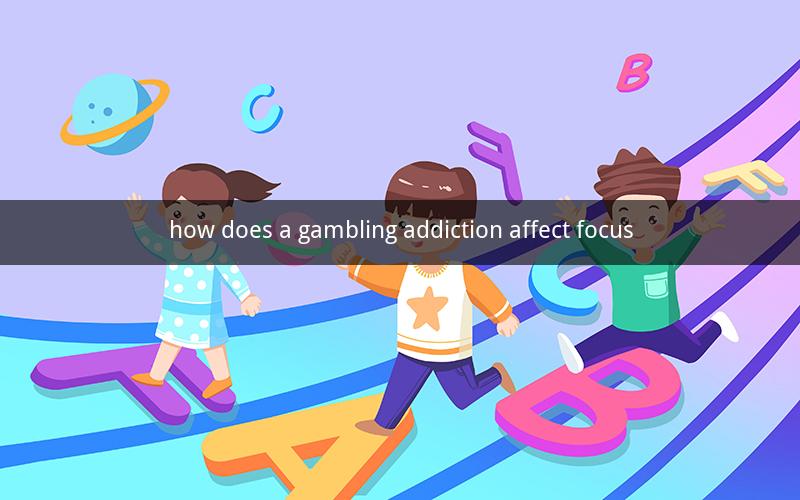
Contents
1. Introduction to Gambling Addiction
2. The Psychological Impact of Gambling
3. The Cognitive Effects on Focus
4. The Role of Dopamine in Gambling and Focus
5. Social and Environmental Factors Influencing Focus
6. Treatment and Support for Gambling Addiction
7. Conclusion
---
1. Introduction to Gambling Addiction
Gambling addiction, often referred to as problem gambling, is a condition characterized by an uncontrollable urge to gamble despite negative consequences. This addiction affects individuals from all walks of life, ranging from teenagers to the elderly. Understanding how gambling addiction affects focus is crucial in addressing its impact on personal, professional, and social aspects of life.
2. The Psychological Impact of Gambling
Gambling addiction has profound psychological effects on individuals. The constant pursuit of winning and the fear of losing can lead to heightened anxiety and stress. This psychological turmoil often manifests in a lack of focus, as the individual's mind is preoccupied with thoughts of gambling.
3. The Cognitive Effects on Focus
The cognitive effects of gambling addiction on focus are multifaceted. Here are some key points:
- Impaired Decision-Making: Individuals with gambling addiction may find it difficult to concentrate on tasks that require sustained attention and decision-making skills.
- Short-Term Memory Issues: The constant distraction and stress associated with gambling can lead to short-term memory problems, making it challenging to retain information.
- Reduced Attention Span: The excitement of gambling can lead to a reduced attention span, making it hard to focus on tasks that do not involve gambling.
4. The Role of Dopamine in Gambling and Focus
Dopamine, a neurotransmitter associated with pleasure and reward, plays a crucial role in gambling addiction. The release of dopamine during gambling activities can create a sense of euphoria, making it difficult for individuals to concentrate on other tasks. This constant release of dopamine can lead to a decrease in focus over time.
5. Social and Environmental Factors Influencing Focus
Social and environmental factors can exacerbate the effects of gambling addiction on focus. Some of these factors include:
- Peer Pressure: Individuals with gambling addiction may face pressure from friends or family to continue gambling, further impacting their focus.
- Access to Gambling: Easy access to gambling venues or online platforms can increase the likelihood of gambling and subsequent focus issues.
- Stressful Life Events: Stressful life events can trigger gambling behavior, leading to a decrease in focus.
6. Treatment and Support for Gambling Addiction
Treating gambling addiction involves a combination of psychological therapy, support groups, and lifestyle changes. Here are some effective treatment approaches:
- Cognitive Behavioral Therapy (CBT): CBT helps individuals recognize and change negative thoughts and behaviors associated with gambling.
- Support Groups: Joining support groups such as Gamblers Anonymous can provide individuals with a sense of community and understanding.
- Lifestyle Changes: Adopting a healthy lifestyle, including regular exercise, a balanced diet, and adequate sleep, can improve focus and overall well-being.
---
7. Conclusion
Gambling addiction has a significant impact on focus, affecting individuals' ability to concentrate, make decisions, and retain information. Recognizing the psychological, cognitive, and environmental factors contributing to gambling addiction is essential in developing effective treatment and support strategies. By addressing these issues, individuals can improve their focus and lead healthier, more fulfilling lives.
---
Questions and Answers
1. Q: How can gambling addiction be identified in a friend or family member?
A: Look for signs such as secretive behavior, missing work or school, financial difficulties, and changes in mood or appearance.
2. Q: What are the risk factors for developing a gambling addiction?
A: Risk factors include a family history of addiction, mental health issues, and exposure to gambling at an early age.
3. Q: Can gambling addiction be cured?
A: While there is no one-size-fits-all cure, many individuals can recover with the right treatment and support.
4. Q: How does gambling addiction affect a person's relationships?
A: It can lead to trust issues, financial strain, and emotional distance from loved ones.
5. Q: What is the most effective form of treatment for gambling addiction?
A: The most effective treatment often involves a combination of therapy, support groups, and lifestyle changes.
6. Q: Can medication help treat gambling addiction?
A: While medication can be used to treat some of the underlying issues, it is not a direct treatment for gambling addiction itself.
7. Q: How can someone overcome the urge to gamble?
A: Techniques such as mindfulness, relaxation exercises, and seeking support from friends and family can help manage the urge.
8. Q: Is it possible to gamble responsibly?
A: For some individuals, gambling responsibly may be possible, but for those with a gambling addiction, it is often challenging.
9. Q: What role does self-discipline play in overcoming gambling addiction?
A: Self-discipline is crucial in overcoming gambling addiction, as it helps individuals resist the urge to gamble despite the desire to do so.
10. Q: Can gambling addiction lead to other health issues?
A: Yes, gambling addiction can lead to mental health issues, financial problems, and other physical health issues due to stress and poor lifestyle choices.